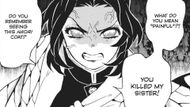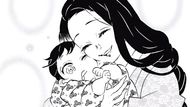As of now, Demon Slayer anime is coming closer to its inclusion, with only the Infinity Castle arc left to be released. Fans have been hyped about Tanjiro's battle against Akaza, as it naturally comes to mind.
But within multiple fights taking place, there is one that is emotionally charged, and it is not Tanjiro’s. The one that stands out is the fight against the Upper Rank Two demon, Doma, versus Shinobu Kocho, Kanao Tsuyuri, and Inosuke Hashibira
Doma is a chilling villain to face, and he should be feared. Because he embodies everything I fear in a villain, he kills without malice, remorse, or even joy. It’s mechanical for him. And that only adds to his terrifying presence.
On the other hand, Shinobu Kocho in Demon Slayer is a fan-favorite character who does not make it out of this battle alive. She had prepared herself for his moment in advance, and she knew she would ultimately be eaten by Doma. Shinobu constantly consumed poison—over 37 kilograms of it—turning her body into a literal time bomb.

Then enter Kanao Tsuyuri and Inosuke Hashibira, who step in to avenge their fallen comrade. Doma, despite his immense power, cannot withstand the combined efforts of Shinobu, Kanao, and Inosuke. He was already weakened by the poison he had ingested from Shinobu. Meanwhile, Kanao’s technique blinds him in one eye, and Inosuke, driven by the memory of his mother, pushes past his limits.
When they acquire a win against this monster of a demon in the series, victory is not just physical. It is symbolic. Shinobu finally fulfilled her promise to her sister, and Kanao managed to step out of the shadows of trauma and became an independent fighter. And finally, Inosuke fought for his mother's honor while he actively reclaimed a part of himself that was lost.
Unlike Tanjiro’s battles in the Infinity Castle arc, Doma’s fight in Demon Slayer is about love, revenge, and justice. When I read the manga where Shinobu died, I cried for a while and openly cheered for Kanao and Inosuke to give their best. That’s how impactful it was. And finally, I felt relief, sorrow, and satisfaction when Doma disintegrated.
The range of emotions that I went through is the reason I believe that it needs to be seen as the most emotional Infinity Castle battle. Finally, his battle in Demon Slayer stands out not because of the action, but because of the humanity behind it.
The hidden pain of Inosuke's childhood is revealed in
Demon Slayer

Initially, it was shown that Inosuke was raised by boars, so he developed an incredibly sharp sense of survival. But what always struck me was how much of Inosuke’s humanity remained intact. Despite having no traditional upbringing, he instinctively seeks connection.
During his fight with Doma, he learns that his mother was killed by him because she tried to escape and threw her baby into the river as a last attempt to save him.
His rage is not just for himself, but for the mother he never got to know. And that, to me, is what makes Inosuke’s character so underrated. Beneath the wild boy exterior lies a broken child who’s still trying to make sense of loss.
In conclusion, this particular fight would be the most emotional one because not many of the viewers would have anticipated its intensity. Tanjiro’s battle with Muzan is undoubtedly spectacular and narratively important, but in this battle, the emotional stakes are intimate, raw, and utterly human.
Each of the three characters in this battle has a reason to fight that goes beyond duty, and that is what makes it powerful and emotionally intense during the Infinity Castle Arc in Demon Slayer.
